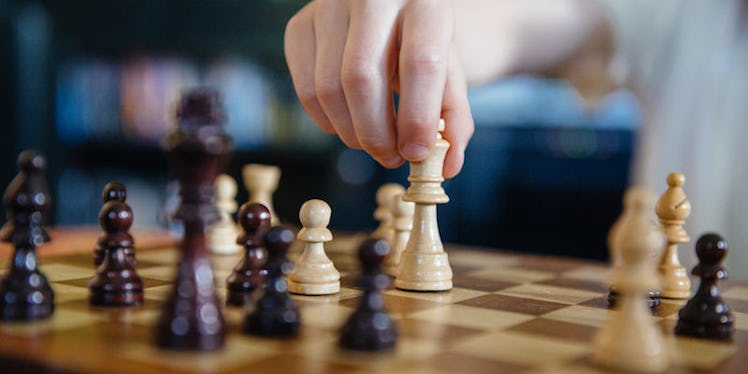
Why Your Next Great Challenge Should Be Treated Like A Game Of Chess
It's an interesting viewpoint on the path to success, but nonetheless, it's one that you might be skeptical of at first. It's an idea that sounds like it could have some validity to it, but a little naïveté, as well. We're talking about the notion that working backwards is the best way to solve your problems: retrograde analysis.
It can draw a few raised eyebrows at first, can't it? To a few, it might sound outright crazy. Yet, expert chess players -- people who could easily be regarded as some of the greatest thinkers in world -- swear by working backwards as their favorite method of problem solving.
"One of my favorites that I love to solve these kind of chess puzzles is called retrograde analysis," said grandmaster Chess player Maurice Ashley. "And what you do with retrograde analysis is that in order to look ahead, it pays to look backwards."
Ashley and his peers favor retrograde analysis because it simplifies the process of getting to a point of victory, as he stated in a six-minute long TED Talk. Because Ashley studies what the final stages of most chess matches look like (what type of pieces are usually on the board, the position in which those pieces are usually placed, etc.), he has an idea of how success plays out.
While you might be inclined to think that retrograde analysis is only beneficial to the game of chess, Ashley says that chess players' preference for retrograde analysis is indicative of the fallacies of the human brain, and says something about how prone to error the mind is.
"The problem with the human is we're very logical creatures," he says.
This statement and the idea of retrograde analysis is justly explained in the image below.
"Your mind is very logical; it proceeds forward," said Ashley. "It just ignores anything that breaks with its logical stream."
There a variety of exercises that can be used in a variety of situations -- not just sentence reading -- to prove the benefits of retrograde analysis, but the results would remain the same. Solving challenges and finding success isn't as simple as putting your head down and plowing from point A to point B.
Doing so, in a manner that helps you avoid stupid errors, mistakes and pitfalls, requires that you analyze your end goal and track backwards from there. To this, you're likely to have to study other models of success that fit your goals.
If your goal as an entrepreneur, for example, is to earn a certain amount of profit in a certain amount of years, you wouldn't be doing things in year five of your plan that successful companies ceased in year two. Likewise, if you want to refine your diet gradually in 9o days, you wouldn't be eating certain foods after two months that successful dieters stopped eating in week two of their diets.
You may as well consider studying others as mimicking a grandmaster's approach to chess. Maurice Ashley did not simply look at the end point (everyone knows what a checkmate looks like, just like you know what graduating from college or getting promoted looks like). He studied at what typically happens three, four, five, or even eight steps ahead of winning a match, ensuring that he knew how to get there before actually getting there. It's a tactic that he claims helps him to recognize when he's beaten an opponent, ten moves before it has even happened.
The question, then, to ask ourselves is simple: What would our lives look like if we treated our challenges like a game of chess? If you ask Ashley, he'll tell you that you'll find success without having to experience the simple, unnecessary and easily avoidable errors, while remaining on your way to disapproving a certain theory.
You know the one, the cliché often quoted by our elderly: "Youth is wasted on the young. [But] if you can see the end game," he says, "Your youth will not be wasted on you."